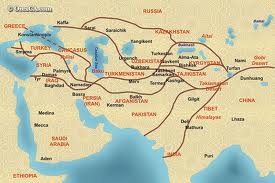Search
Democracy Links
Member's Off-site Blogs
from pipelineistan .....

Future historians may well agree that the twenty-first century Silk Road first opened for business on December 14, 2009. That was the day a crucial stretch of pipeline officially went into operation linking the fabulously energy-rich state of Turkmenistan (via Kazakhstan and Uzbekistan) to Xinjiang Province in China's far west.
Hyperbole did not deter the spectacularly named Gurbanguly Berdymukhamedov, Turkmenistan's president, from bragging, "This project has not only commercial or economic value. It is also political. China, through its wise and farsighted policy, has become one of the key guarantors of global security."
The bottom line is that, by 2013, Shanghai, Guangzhou, and Hong Kong will be cruising to ever more dizzying economic heights courtesy of natural gas supplied by the 1,833-kilometer-long Central Asia Pipeline, then projected to be operating at full capacity. And to think that, in a few more years, China's big cities will undoubtedly also be getting a taste of Iraq's fabulous, barely tapped oil reserves, conservatively estimated at 115 billion barrels, but possibly closer to 143 billion barrels, which would put it ahead of Iran. When the Bush administration's armchair generals launched their Global War on Terror, this was not exactly what they had in mind.
China's economy is thirsty, and so it's drinking deeper and planning deeper yet. It craves Iraq's oil and Turkmenistan's natural gas, as well as oil from Kazakhstan. Yet instead of spending more than a trillion dollars on an illegal war in Iraq or setting up military bases all over the Greater Middle East and Central Asia, China used its state oil companies to get some of the energy it needed simply by bidding for it in a perfectly legal Iraqi oil auction.
Meanwhile, in the New Great Game in Eurasia, China had the good sense not to send a soldier anywhere or get bogged down in an infinite quagmire in Afghanistan. Instead, the Chinese simply made a direct commercial deal with Turkmenistan and, profiting from that country's disagreements with Moscow, built itself a pipeline which will provide much of the natural gas it needs.
No wonder the Obama administration's Eurasian energy czar Richard Morningstar was forced to admit at a congressional hearing that the U.S. simply cannot compete with China when it comes to Central Asia's energy wealth. If only he had delivered the same message to the Pentagon.
- By John Richardson at 13 Oct 2010 - 9:00pm
- John Richardson's blog
- Login or register to post comments
Recent comments
2 hours 43 min ago
3 hours 16 min ago
3 hours 38 min ago
3 hours 56 min ago
4 hours 8 min ago
16 hours 57 min ago
17 hours 13 min ago
18 hours 59 min ago
19 hours 42 min ago
1 day 25 min ago